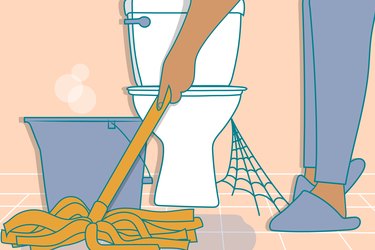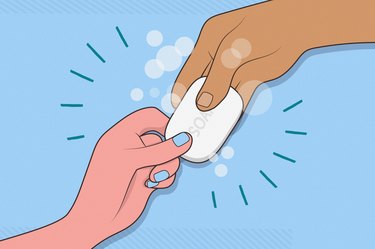
With all the foot traffic they get, public restrooms are ridiculously dirty. It's why you never touch the faucet without a tissue in hand or opt to push the door open with your hip.
You don't need to worry about these icky germs at home, though, right?
Video of the Day
Video of the Day
Well, not so fast. Hate to break it to you, but research has found that private bathrooms harbor the same potentially harmful pathogens as public lavatories, including Staphylococcus, methicillin-resistant staphylococcus aureus (MRSA), human papilloma virus (HPV) and herpes, according to University of Chicago Medicine.
And if you haven't cleaned your bathroom in a while, odds are it's crawling with even more of these creepy critters. So you're probably wondering what this means for your health.
We spoke to Kelly Reynolds, PhD, director of the Environment, Exposure Science and Risk Assessment Center at the University of Arizona, to get the 411 on whether a begrimed bathroom can make you sick (plus tips on how and how often you should clean your bathroom).
What Germs Are Lurking in a Dirty Bathroom?
A lengthy list of live microorganisms can linger in an unclean lavatory.
"Fungus, including mold, mildew, yeasts and some types of bacteria rapidly build up in bathroom environments," Reynolds says. "These humidity-loving microbes can be seen in the corners and crevices of showers, sinks, faucet handles and toilet bowls, and they can even grow on floors and walls."
Can These Germs Make You Ill?
It's possible that an unsanitary bathroom space can make you sick, especially if you have a weakened immune system. Here are a few ways a rank restroom may wreak havoc on your health:
1. May Exacerbate Respiratory Issues
"Bacteria commonly found in showers can cause lung infections, particularly in persons who are already immunocompromised (for example, persons with chronic infections, cancer or autoimmune diseases)," Reynolds says.
Indeed, showerheads and faucets can amass many meddling microbes, including a bad bacteria called Legionella pneumophilia, according to the Centers for Disease Control and Prevention (CDC).
And when vulnerable people — like older adults, immunocompromised individuals and those with chronic lung disease and other underlying health problems — breathe or ingest water containing Legionella, they can develop a serious lung infection called Legionnaires' disease, per the CDC.
Other pathogens in your bathroom can result in respiratory issues, too. Case in point: mold. "Allergies to mold are very common, and exposures to increased levels can trigger allergic reactions or asthma," Reynolds says.
Tip
If you experience symptoms of a mold allergy, like sneezing, wheezing or itchy eyes, nose or throat, visit your doctor for treatment, according to the Mayo Clinic.
2. Can Cause Skin Infections
A soiled bathroom may also sabotage your skin health.
"Moist bathroom environments can readily support the growth of Trychophyton fungi, the causative agent of athlete's foot in shared showers," Reynolds says. And by shared, we mean any shower stall that's used by anyone other than you (think: your partner, roommate, etc.)
Athlete's foot is "an infection that causes symptoms of dry, flaky and itchy skin on the foot, and may spread to other areas of the body if left untreated," she says.
But fungi aren't your only foe. In addition to athlete's foot, other common viral and bacterial skin infections you may pick up in a tainted tub include warts, HPV and MRSA, according to the University of Utah Health.
And your risk of contracting one of these pesky skin pathogens increases when you have an open cut or blister on your foot and/or you have a weakened immune system, per the University of Utah Health.
3. May Produce Stomach Problems
If you're having unexplained tummy trouble, your sullied shower could be the source of your stomach woes.
Here's why: "Ingestion of bacteria that accumulate in showers [such as E. coli] could also cause diarrhea or symptoms of the stomach flu [think: nausea and vomiting]," Reynolds says.
Wait, how the heck do E. coli bacteria (which are typically found in fecal matter) end up in your tub? Simple: If someone poops and doesn't wash their hands, their filthy fingers can spread germs to anything they touch, including sinks, shower stalls and every surface in your bathroom.
And the next person who uses the restroom runs the risk of becoming infected. When you touch a dirty shower surface, you can easily transfer harmful bacteria to the mouth, Reynolds says.
While most E. coli infections normally resolve without treatment in a week or so, sometimes serious blood and kidney problems may develop in vulnerable populations like children and older adults, according to the University of Michigan Health.
Warning
If you have bloody diarrhea as the result of an E. coli infection (or any other condition, for that matter), that's a sign you need to see your doctor ASAP, per the University of Michigan Health.
How Often Should You Deep Clean Your Bathroom?
There's no straightforward answer to this question. "It depends in part on how often it is used, how well it is ventilated and how dirty the surfaces are," Reynolds says.
That said, "a good routine is to clean and disinfect bathroom surfaces at least weekly or more often depending on use and how susceptible you are to infections," she adds.
How to Deep Clean Your Bathroom
Here are Reynolds tips for maintaining a microbe-free restroom:
1. Clean the Floor and Walls in the Shower and Bathroom
"Grout lines in showers, sinks or on walls and floors can be challenging to keep dry and microbe-free," Reynolds says. But a little elbow grease can go a long way to get rid of germs hanging around grout.
Each week, use a mild soap detergent and brush to scrub away any visible grub, paying special attention to the grout.
Then apply a disinfectant spray designed specifically to kill microbes, Reynolds says.
Tip
Sprays — which can cover larger surface areas — are more suited for showers, walls and floors than wipes, Reynolds says.
2. Disinfect Sinks and Toilets
Disinfecting wipes are great for quick decontamination of sink, toilet and other handles, Reynolds says. Wiping down these areas every week will keep the bacteria and other bugs at bay.
And for inside the toilet bowl, a disinfect spray coupled with a toilet brush (that can tackle tough-to-reach surfaces like under the rim) will do the trick.
3. Don't Forget Your Shower Curtains
"Shower curtains tend to be the most likely sites for the accumulation of microbes in bathrooms," Reynolds says. So keeping curtains clean is key.
Laundering your shower curtain (as long as it's washing-machine safe) once or twice a month can help keep it from becoming a hotspot for germ growth, Reynolds says.
If it's not machine-washable, spray it with a sanitizer (which you can also do if you have shower doors), Reynolds says.
4. Launder Your Bathmat
The same goes for bathmats, which can be a bastion for bacteria and other problematic pathogens. Launder (if possible) or use a disinfectant spray to keep microbes from building up.
Remember, "any areas that stay moist for extended times [like bathmats] are prone to contamination," Reynolds says.
5. Sanitize Your Showerhead
Showerheads can be strongholds for bad biofilms, so they need to be sanitized too, Reynolds says. Add them to the list of shower surfaces to disinfect each week — a disinfectant spray or foaming product will suffice.
Once a year for a deeper clean, unscrew your showerhead, give it a nice soak in a diluted disinfectant solution and then scrub away stubborn dirt, debris or biofilm (an old toothbrush is a terrific tool for this task).
So, How Bad Is It Really to Never Deep Clean Your Bathroom?
The fact is, bathrooms can quickly accumulate microbes. "And if you can see or smell mold or bacteria, you likely have millions of colonies growing," Reynolds says.
That being said, a less-than-sparkling lavatory likely won't hinder your health as long as you have a robust immune system.
For most people, a weekly wipe-down with disinfectant will help keep these cooties in check.
- Centers for Disease Control and Prevention: "Legionnaires’ Disease"
- Centers for Disease Control and Prevention: “Legionella (Legionnaires' Disease and Pontiac Fever)”
- University of Utah Health: “BEWARE THE SHOWER FLOOR”
- University of Michigan Health: “E. Coli Infection From Food or Water”
- University of Chicago Medicine: "The microbes growing in a public restroom (and why that's not as bad as it sounds)"
- Mayo Clinic: "Mold allergy"
Is this an emergency? If you are experiencing serious medical symptoms, please see the National Library of Medicine’s list of signs you need emergency medical attention or call 911.



